

Medscape Log In. Medscape Log In. Pub-social-media-guidelines.pdf. Online Professionalism Investigations by State Medical Boards: First, Do No Harm. From the University of California, San Francisco, School of Medicine, San Francisco, California; Federation of State Medical Boards, Euless, Texas; Children's National Medical Center, George Washington University School of Medicine, and Washington DC Veterans Affairs Medical Center, Washington, DC; Yale University School of Medicine, New Haven, Connecticut; and University of Texas Southwestern Medical School, Dallas, Texas.
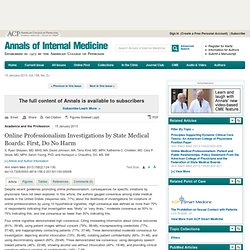
Disclaimer: Dr. Greysen had full access to all of the data in the study and takes responsibility for their integrity and the accuracy of the data analysis. Acknowledgment: The authors thank the Robert Wood Johnson Foundation Clinical Scholars program and the Department of Veterans Affairs for support of this research. They also thank the key informants at state medical boards and the FSMB for their valuable insight into the structure and function of state medical and osteopathic boards.
Requests for Single Reprints: S. Current Author Addresses: Dr. Mr. Dr. Dr. Dr. Social Media in Healthcare : We're Getting There But Have a Ways to Go. The evolution of social media in healthcare seems to be rapidly reaching a tipping point.
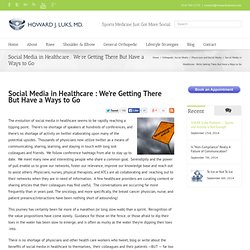
There’s no shortage of speakers at hundreds of conferences, and there’s no shortage of activity on twitter elaborating upon many of the potential upsides. Thousands of physicians now utilize twitter as a means of communicating, sharing, learning, and staying in touch with long lost colleagues and friends. We follow conference hashtags from afar to stay up to date. We meet many new and interesting people who share a common goal. Serendipity and the power of pull enable us to grow our networks, foster our relevance, improve our knowledge base and reach out to assist others.
Why Patient Engagement Really Does Matter and Why So Many People Are Getting It Wrong. By Rob Lamberts, MD “Patient engagement.”
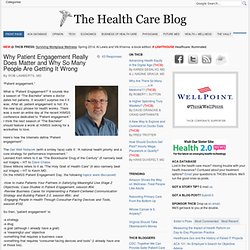
What is “Patient Engagement?” It sounds like a season of “The Bachelor” where a doctor dates hot patients. It wouldn’t surprise me if it was. After all, patient engagement is hot; it’s the new buzz phrase for health wonks. Here’s how the Internets define “Patient engagement”: Public Health: There's an App for That: The Smartphone Revolution in Healthcare. Integrative Medicine - Alternative Medicine - Complementary Medicine at IntegrativePractitioner.com : Integrative Practitioner Webinar Series: Social Media in Integrative Practice. Webinars found: 44 Understanding Diet Induced Inflammation Date:October 1, 2013 | (Recorded) Speaker(s)/Moderator(s): Dr.
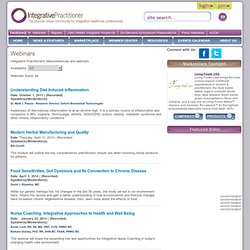
Mark J. Awareness of diet-induced inflammation is at an all-time high. Modern Herbal Manufacturing and Quality Date: Thursday, April 11, 2013 | (Recorded) This module will outline the key considerations practitioners should use when choosing herbal products for patients. Food Sensitivities, Gut Dysbiosis and Its Connection to Chronic Disease. The "ROI" of a Social Presence in Healthcare (with tweets) · hjluks. Which social media tools are physician practices in love with? As physician practices become more comfortable in the social media sphere, their go-to preference for social media tools to attract patients is changing, according to a Digital Doctor survey initiated by ZocDoc. Facebook topped the list with half of the 360 respondents saying they had a Facebook page to attract clients.
Another 34 percent are using Google+ For the uninitiated, it’s like a picture and video heavy version of Facebook. LinkedIn comes in third with 28 percent of doctors saying they had a presence on it. That’s probably a place where patients would go to check on their physicians experience level. Medicine and Social Media: Your Personal Social ROI - Howard Luks, MD. Enable, Engage,Comfort, Educate ... and Thrive. Raise your hands if you would like to know more about your doctor before you enter their office … and be able to further educate yourself after you have left.
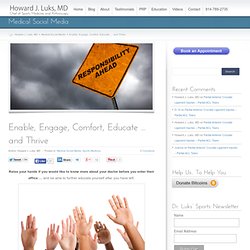
You’re not alone ! Ok… who’s paying attention? Doctors are human beings… so are patients. Some people trust and get along with one another … some, not so much. That’s fine… It would be nice if you were able to get to know more about your doctor before you entered the four walls of their office (and perhaps waited an hour to see them).
A typical “parking spot” style physicians’ website with purchased pictures, limited content, and their address and telephone number isn’t going to cut it anymore. Physicians have a moral obligation to educate their patients. A deep digital presence can also go a very long way in terms of “humanizing your presence”, and enabling your patients to determine if they think you are a proper fit. As Sarah-Jayne Gratton describes in this interview: You are your brand. Sarah goes on … So what’s the dilemma? Social Media in #Meded - MacLean Center Conference · futuredocs. Dr. John La Puma: Twitter, An Important Tool For Healthcare.
One of the most difficult industries for social media to enter is the healthcare industry. Dr. John La Puma, the founder of Chef Clinic/ChefMD, spoke with WebProNews about this area at the BlogWorld Expo and said that, even though it is challenging, social media is necessary in healthcare. Dr. La Puma told us that he tries to encourage more doctors to get on board with social since as little as 3 percent are currently involved in it. _Should_Healthcare_Organizations_Use_Social_Media.pdf (application/pdf Object) The big problem with most social media policies for physicians. Social media guidelines for physicians frequently focus on the need for doctors to separate their personal from their professional identities, but those types of policies get social media all wrong, according to a viewpoint recently published in JAMA.
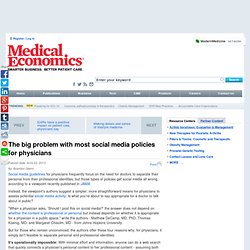
Instead, the viewpoint's authors suggest a simpler, more straightforward means for physicians to assess potential social media activity: Is what you're about to say appropriate for a doctor to talk about in public? "When a physician asks, 'Should I post this on social media? ' the answer does not depend on whether the content is professional or personal but instead depends on whether it is appropriate for a physician in a public space," write the authors - Matthew DeCamp, MD, PhD; Thomas Koenig, MD; and Margaret Chisolm, MD - from Johns Hopkins University.